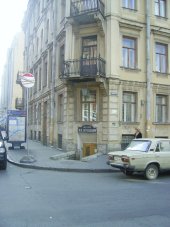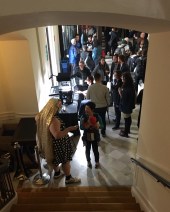“We’ve got to be nicer to each other. A little more humility; a little more good faith . . .”

These were a few solutions to the condition of the country today offered recently by Author Tom Nichols, during a Commonwealth Club talk titled “Are Facts Dead?” Facts may not be hopelessly dead, but Nichols fears for their survival. (He’s talking about Facts here. Established knowledge. “Alternative facts” seem unendangered.) Nichols maintains that the proliferation of fact-slayers has a lot to do with the rise of narcissism and its corresponding I-know-more-than-you-do assumption.
Nichols, Professor of National Security Affairs at the Naval War College and a CBS TV political analyst, is most recently the author of The Death of Expertise: The Campaign Against Established Knowledge and Why It Matters. Just to reinforce the fact that he falls into the category of expert himself, he is also a five-time undefeated Jeopardy! champion.
“The attack on expertise is part of the narcissistic trend,” he says; “but it’s also because people feel things are out of control. It becomes empowering to say ‘I don’t believe you’ – ‘I don’t believe the experts.’” Nichols readily admits that experts can be wrong. People like to point out ‘expert failure,’ to say, “Well, Thalidomide. Challenger.” You will never find an issue on which everyone was 100% right, he concedes, or a person who’s never made a mistake. But the denigration of experts and widespread refusal to accept known facts is a growing threat.

Moderator Melissa Caen, a political and legal analyst, TV personality and no slouch with facts and expertise herself, asked about Nichols’ students, and whether the problem of expert-doubting often starts with (adult) students.
“I tell my students,” Nichols says, “’You’re here to form opinions, not to have your opinions confirmed.’ The best weapon they can have, the most important skill to develop, is critical thinking. Rigid, ideological thinkers are easy to manipulate; critical thinkers are hard to manipulate.” Nichols can wax indignant about teachers who say they learn more from their students than their students learn from them. “I tell them NO! If they’re not learning far more from you then you’re not doing your job.”
The quick acceptance of any absurdity because it’s been pronounced on a TV show or an internet site, along with the doubting of experts is in no way confined to students, though. Non-facts, “alternative facts” and outright lies are being repeated over and over again by public figures today – encouraging people of all ages to accept them as truth. And this, Nichols believes, presents a very real threat to our democracy.
The only people who can keep things on track, Nichols argues, “are the voters. Ordinary citizens.” And it will help if they let experts do their job of getting at the facts. A little critical thinking on all sides might still keep civilization afloat.
Meanwhile, maybe we should also try to be nicer to each other.

























